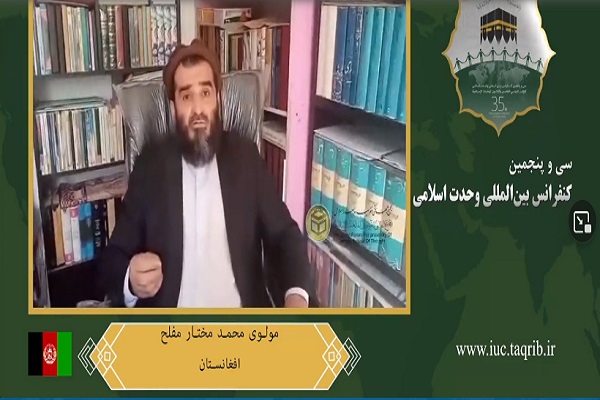Realization of Muslim Unity A Religious Duty: Senior Afghan Scholar

Maintaining Islamic unity is among principles that has been mentioned in the Holy Quran many times, Mowlawi Muhammad Muktar Muflih said in an address to the 35th International Islamic Unity Conference on Tuesday.
He said unity among followers of Islam is, therefore, a Quranic and religious principle and not just a political one.
Anyone who believes in God and considers Prophet Muhammad (PBUH) as the messenger of God and the Quran as a divine book is duty bound to work toward enhancing Islamic unity, he said.
Sheikh Muflih said Islam is a monotheistic religion that has come for guidance of all humanity and, thus, unity of the human society under the banner of the Quran is a natural course of affairs in this world according to Islam and the Quran.
The first step toward unity among all human beings is achieving unity among Muslim nations, he stated.
All nations of the Muslim Ummah ought to come together in accordance to the teachings of the Holy Quran, he went on to say.
The Afghan scholar referred to racist prejudices and extremist ideologies as the biggest obstacles to achieving Muslim unity and stressed that, as the Holy Prophet (PBUH) has said, all men and women are the children of Adam and Eve and have no superiority over others except for their Taqwa (God-fearing).
Elsewhere in his remarks, the scholar hailed the role of the late founder of the Islamic Republic of Iran Imam Khomeini (RA) and Leader of the Islamic Revolution Ayatollah Seyed Ali Khamenei in supporting Islamic unity.
The 35th International Conference on Islamic Unity got under way on Tuesday morning in Tehran with the participation of Iranian President Ebrahim Raeisi and a number of Iranian and foreign Muslim scholars.
This edition of the event is being held both virtually and in person with a limited number of guests due to concerns over the coronavirus pandemic.
“Islamic Empathy and Sympathy and Avoidance of Tensions and Conflicts” is one of the main themes of the conference which will continue for five days in Tehran.
Just war and just peace, Palestine and Islamic resistance, Islamic fraternity and countering terrorism; mutual respect among Islamic schools of thought; and Ummah Wahida (united community) and a union of Islamic countries will be among the subjects of discussion.
230 guests including 52 scholars from 16 foreign countries have taken part in the conference, he said, adding that scholars will give a total of 514 speeches as 360 addresses will be made through video-conference.
The meetings of the conference will be held with maintaining health protocols. The event will wrap up on Saturday with participation of guests and Iranian Parliament Speaker Mohammad Bagher Ghalibaf.



